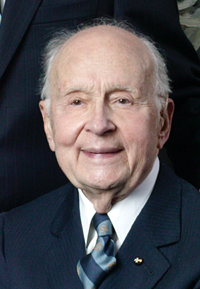 Patients of Hopkins physicians GEORGE T. NAGER, M.D., and John Niparko, M.D., the inaugural chairholder, supported the creation of this professorship. Dr. Nager was considered one of the world’s leading otological surgeons and otopathologists, as well as an outstanding teacher, mentor, and clinician. Among his many honors was inclusion in the American Otological Society, which restricts membership to 100 living individuals, and in the Collegium, which permits only 20 American members. Dr. Nager came to Hopkins as a fellow and joined the faculty in 1954. In 1969, he was named director of the Division of Otology and Laryngology, which the following year became the Department of Otolaryngology-Head and Neck Surgery. He stepped down as chairman in 1984. Dr. Nager reorganized the Temporal Bone Pathology Laboratory, which under his leadership gained an international reputation. His publications on tumors and bone diseases involving the ear have become classic references. In 2001 he was named a Distinguished Service Professor. Dr. Nager died in 2010.
Patients of Hopkins physicians GEORGE T. NAGER, M.D., and John Niparko, M.D., the inaugural chairholder, supported the creation of this professorship. Dr. Nager was considered one of the world’s leading otological surgeons and otopathologists, as well as an outstanding teacher, mentor, and clinician. Among his many honors was inclusion in the American Otological Society, which restricts membership to 100 living individuals, and in the Collegium, which permits only 20 American members. Dr. Nager came to Hopkins as a fellow and joined the faculty in 1954. In 1969, he was named director of the Division of Otology and Laryngology, which the following year became the Department of Otolaryngology-Head and Neck Surgery. He stepped down as chairman in 1984. Dr. Nager reorganized the Temporal Bone Pathology Laboratory, which under his leadership gained an international reputation. His publications on tumors and bone diseases involving the ear have become classic references. In 2001 he was named a Distinguished Service Professor. Dr. Nager died in 2010.
Return
to All Schools